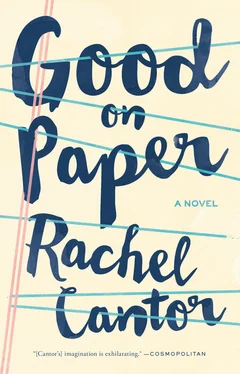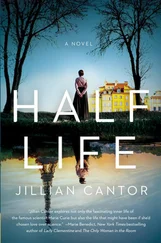Her cast was removed; her shrunken arm grew plump again and brown.
•
Benny visited only when Andi was asleep or at school — she’d been through enough, I said. From now on, she could count on me. Saturday nights, Dotty sat and Benny made me a vegan dinner. I’d push tofu around on my plate, try not to share my worries.
Take the money, he’d say. Quit your awful job!
I’d returned Romei’s retainer, left five dollars in my account for good luck. He rewired the full sum of my “fee”; he said I’d earned it. I wired it back, gave instructions to my bank.
When Benny pressed me, I told him to shut up or I’d leave the room.
Only there was no place for me to go.
I don’t want any connection with that man! Can’t you understand?
Benny would shrug, impatient, as if there it was, the solution to my problems.
You need a plan, he said. It’s October. If you’re not willing to settle things with Ahmad, you need to figure out what to do.
He’s not going to throw us out. He’ll lose the apartment if he does. I’ll make sure he does. The university only gives apartments like that to families .
He had the apartment before he had a family, Shira.
I don’t care, I said.
He can’t stay at his friend’s forever.
Yes, he can.
You’re in denial.
I deny that.
But Benny didn’t laugh. He was tiring of me, I could tell.
This is no relationship! he’d say.
I’d said no sex. He knew what Romei was doing, he’d played his part, how could I trust him? Besides, didn’t he really want Sandrine, his new salesgirl, the candle artist from Spain: she wore an eye patch for no reason and spoke in tongues. She was organizing his books by color, it was muy bonita that way, much better for the store’s feng shui . Benny thought she was spiritual ; I thought, well, it’s no secret what I thought. After a revival, she’d lay in bed for days while I called in sick and reshelved books in alphabetical order.
He wanted me to read Shir haShirim with him, said it would be good for us. I read Dante instead, Vita Nuova , as if it might tell me something about who I was and what would happen next.
It wasn’t encouraging: after death destroys Dante’s world, he writes poems of grief, then stops writing, stops living. On the anniversary of Beatrice’s death, he sits idly, doodling and dreaming of her, when mysterious men stand suddenly before him. They observe his drawing, say nothing , and dissolve back into the text, their sole purpose having been to recall him to himself, to jolt him out of unconsciousness.
He writes again, but it doesn’t go well. He resurrects his aesthetic-of-praise and it collapses — after just four lines! How to praise someone who’s perfect and perfectly absent? He tries another version of that poem — finishing it, we suspect, because this time it’s about him, his grief and lamentations — making it an artistic throwback. Hyperalert, he raises his eyes and sees a woman watching him, her eyes full of pity — what could be wrong with that? Plenty, because she isn’t Beatrice; his interest in her is a sign of emotional and spiritual backslide.
The whole section is about backtracking, Dante’s artistic, emotional, and spiritual regressions when he is unable to assimilate Beatrice’s death.
This is the Dante I loved best: so human, so lost! Forgetful of his purpose, paddling without direction, sketching idly, visited by angels he doesn’t recognize as such, seeking comfort in used ideas, infatuated by a pale imitation of Beatrice, rationalizing a love he must eventually reject, which comes unbidden when he must have despaired of ever loving again. He faces his greatest test here: how to survive the harrowing, the death of the woman whose life gave his meaning. By any measure, he fails, at least at first, for he is overcome by his greatest weaknesses — passivity, self-pity, desire, sophistry, a longing for emotional comfort, a narcissistic need to be seen, admired, and understood. I don’t know that any of us could do better.
Was I unconscious? Backsliding? Where were my angels? What regressions would distract me from my destiny? Did I have a destiny? It was too late to become a Good Humor Man, or a Bad Humor Man, too late to win a noble prize. I was an old dog: I’d played out my tricks; there could be no new life for me. Maybe my destiny was this : raising a child who hated me, and crying myself to sleep at night.
So the weeks passed; autumn threatened to slip unremarked into winter.

The Monday before Thanksgiving, Benny stopped by. Andi was in bed, and I was looking over brochures for Caron, an Italian manufacturer of passenger ferries.
Guess what? I said. I got a new job, starting next week. No more filing.
Good! he said. I brought the stories for you to read this afternoon.
I’d agreed to read stories for Gilgul , give Benny my opinion. For what that was worth.
I’ll be earning more money, I persisted. Temp to perm.
Great! Benny said. I used the key you gave me, I put them in your study. The stories, I mean.
Thanks, I said, not realizing what he’d said. Do you want to hear what I’ll be doing?
Benny nodded halfheartedly, so I told him how Luigi, Caron’s U.S. sales manager, was so impressed that I could take dictation in Italian that he insisted I stay at least a month.
You had some papers in there, on the desk.
Huh? I said, looking up.
He was still standing, holding the end of his beard, a folder tucked under his arm.
Some papers. Your translation. It was there. I read some of it.
Ah, I said, putting down the brochures. You shouldn’t have.
I know. It was there.
Uh huh.
Shira, it was beautiful, he said, sitting next to me. Really!
Which part? I asked, despite myself.
Esther and Romei at the restaurant.
Oh, I said. Shit.
I want to read it to you.
You what?
I want read it to you. Will you let me?
He’d opened the folder, my work was in there.
You’ll stop at nothing, I said.
Listen, he said, putting his arm around me. Close your eyes and listen.
•
It was good.
I was surprised. I listened as a writer, a translator, a daughter.
We sat in silence a moment.
What’s your point? I asked.
I want it in Gilgul .
No! You’re crazy!
I’m not crazy. This is a major work by a major author. It would be good for you, too!
You just want Esther to see this …
This has nothing to do with Esther. Romei would never let her see it, out of context. She’s too ill — what would be the point?
You’re trying to manipulate me.
I’m responding to what you said.
You think you can get a grant for this!
Of course! And readers. The poet describes the genesis of his Nobel Prize — winning poetics — who wouldn’t be interested? Better, he admits that his poetics arose out of his wife’s suffering and his own self-centeredness, his inability to feel. That’s powerful stuff. He discredits his entire life’s work, calls it graffiti!
He does not! Where does he do that!
You don’t see? Look, he said, riffling excitedly through the pages. His first mature poems are associated with scribblings, obscene chalk drawings on a wall, his wife’s nonsensical ravings, the inarticulate mewling of an underfed cat. His wife wipes vomit onto the tablecloth he uses as his page — not exactly subtle! His first poem is smeared with blood — tomato sauce, drops of wine — the blood of the suffering Christ. Again, not subtle.
Читать дальше













